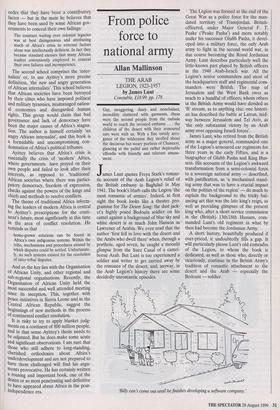From police force to national army
Allan Mallinson
THE ARAB LEGION, 1923-1957 by James Lunt Constable, £18.99, pp. 178
Gay, swaggering, dusty and nonchalant, incredibly cluttered with garments, these were the second people from the outside world to reach the invested embassy . . . the children of the desert with their armoured cars were with us. With a fine untidy arro- gance of the wilderness they strolled about the decorous but weary purlieus of Chancery, glancing at the pallid and rather deplorable effendis with friendly and tolerant amuse- ment.
James Lunt quotes Freya Stark's roman- tic account of the Arab Legion's relief of the British embassy in Baghdad in May 1941. The book's blurb calls the Legion 'the most romantic of armies'. Indeed, at first sight the book looks like a theatre pro- gramme for The Desert Song: the dust jack- et's highly posed Bedouin soldier on his camel against a background of blue sky and white desert is as much John Hanson as Lawrence of Arabia. We even read that the author 'first fell in love with the desert and the Arabs who dwell there' when, through a porthole, aged seven, he caught a moonlit glimpse from the Suez Canal of a camel- borne Arab. But Lunt is too experienced a soldier and writer to get carried away by the romance of the desert, and, anyway, in the Arab Legion's history there are some decidedly unromantic episodes. The Legion was formed at the end of the Great War as a police force for the man- dated territory of Transjordan. British- officered, under Major General F. T. Peake (Teake Pasha') and more notably under his successor Glubb Pasha, it devel- oped into a military force, the only Arab army to fight in the second world war, in due course becoming the Royal Jordanian Army. Lunt describes particularly well the little-known part played by British officers in the 1948 Arab-Israeli war. All the Legion's senior commanders and most of the headquarters staff and regimental com- manders were British. The map of Jerusalem and the West Bank owes as much to a handful of officers, whom others in the British Army would have derided as `B' stream, as to anything else: one histori- an has described the battle at Latrun, mid- way between Jerusalem and Tel Aviv, as `the only substantial victory by an Arab army over opposing Israeli forces'.
James Lunt, who retired from the British army as a major general, commanded one of the Legion's armoured car regiments for three years in the early Fifties, and is a biographer of Glubb Pasha and King Hus- sein. His accounts of the Legion's awkward transformation from a semi-colonial force to a sovereign national army — described, with justification, as 'a mechanised stand- ing army that was to have a crucial impact on the politics of the region' — do much to explain the background to the tricky bal- ancing act that was the late king's reign, as well as providing glimpses of the present king who, after a short service commission in the (British) 13th/18th Hussars, com- manded Lunt's old regiment in what by then had become the Jordanian Army.
A short history, beautifully produced if over-priced, it undoubtedly fills a gap. It will particularly please Lunt's old comrades of the Legion, to whom the book is dedicated, as well as those who, directly or vicariously, continue in the British Army's tradition of romantic attachment to the desert and the Arab — especially the Bedouin — soldier.
Billy can't come out until he finishes developing a software company.'


























































 Previous page
Previous page